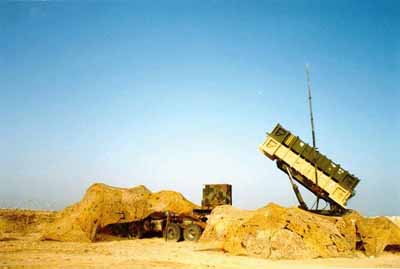US PATRIOT
MISSILES DEPLOYED OVERSEAS ARE REPLACED
The United States
Department of Defence has said that all Patriot PAC-2 missiles deployed
in the Gulf, region and in South Korea have been replaced because
depot level testing had indicated that some of the missile subsystems
were not performing as designed. The replacement activity has taken
ten days.

Explaining the
problem to reporters yesterday, Lt Gen Paul Kern, Military Deputy
for the Assistant Secretary of the Army for Logistics, Logistics and
Technology, said that the problem had not yet been fully identified
but "...one component that we know we have a problem with, which
was reported, was the radio frequency downlink, an RFDL." The
'black box' sends signals back and forth between the ground station
and to the missile. The Army and Raytheon, the PAC-2 missile manufacturer,
were working hard to identify the underlying cause of the fault, Kern
said. Replacement parts for the affected subsystem could cost $80,000-$100,000
and the number of missiles replaced was "...in the hundreds."
Kern identified
the affected missiles as those that been on standby, on launchers
for periods of six months or more. Missiles in reserve, in storage,
were not affected. Missiles on standby have electric current passing
through all the time, to maintain instant readiness and this is thought
to have caused the malfunction.
Patriot, although
originally designed as an anti aircraft weapon for the Cold War, was
converted to an anti-missile during the Gulf War when it was used
to defend against Scud missiles launched by Iraq. It is designed with
an explosive warhead designed to detonate in close proximity to the
target, destroying it either by a sympathetic detonation or by the
fragments of the warhead. Because this method does not guarantee that
enemy warheads containing chemical or biological will be totally destroyed,
Raytheon is developing PAC-3, which operates as a hit-to-kill missile.
The United States
has warned the seven countries (Israel, Saudi Arabia, Kuwait, Taiwan,
Japan, Germany and the Netherlands) to which Patriot has been sold
of the problem, but not until three days ago. It is probable that
the first four, which have identifiable threats may face the same
problems.
Kern said that
the United States did not had sufficient stocks of PAC-2 missiles
to replace those sold overseas, if that was requested.
Defence Systems
Daily 24.03.2000
Армия США провела
замену всех ракет Patriot PAC-2, которые находились в состоянии полной
боевой готовности. Решение о замене было принято после того, как были
обнаружены признаки повреждения отдельных компонентов ракет. Это произошло
раньше срока, указанного в спецификации производителя ракет компании
Raytheon. Большинство ракет Patriot PAC-2 развернуты в Южной Корее
и на Ближнем Востоке для защиты войск США от угрозы ударов баллистических
ракет.
Компания Raytheon гарантирует исправность ракет, находящихся в состоянии
полной боевой готовности, в течение 6 месяцев. Армия США держала ракеты
в таком состоянии годами, заменяя 50-70 из них для проведения испытаний
и диагностических проверок в полевых условиях. Замена ракет Patriot
PAC-2 была проведена в течение одной недели в секретном режиме. Только
после этого информация о неисправностях была доведена до сведения
стран, имеющих на вооружении эти ракеты (Израиль, Саудовская Аравия
и Германия). По мнению специалистов, у этих стран не обязательно возникнут
схожие проблемы, поскольку они не держат ракеты в состоянии полной
боевой готовности, как США.
© Перевод статьи
на русский НИИЭАП (http://www.avias.com)